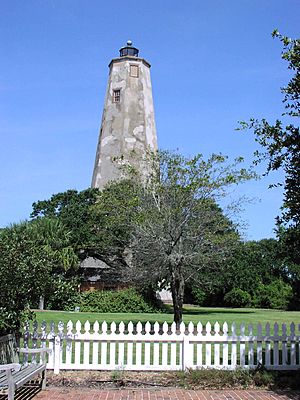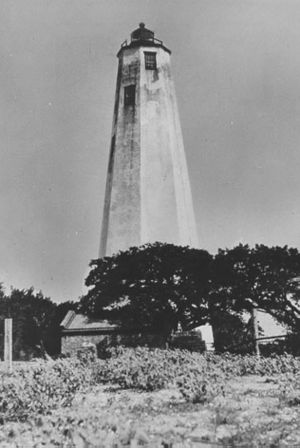Bald Head Light facts for kids
 |
|
| "Old Baldy" | |
| Location | Bald Head Island, Cape Fear River, North Carolina |
|---|---|
| Coordinates | 33°52′24.5″N 78°0′1.25″W / 33.873472°N 78.0003472°W |
| Year first constructed | 1817 |
| Year first lit | 1817 |
| Deactivated | light beacon, 1935 radio beacon, 1958 |
| Foundation | Dressed stone |
| Construction | Brick |
| Tower shape | Octagonal |
| Markings / pattern | Mottled stucco plaster (originally white) |
| Height | 110 feet (34 m) |
| Original lens | 15 Lewis lamps, 1817 3rd order Fresnel lens, 1855 4th order fixed Fresnel lens, 1903 to 1935 |
| Range | 14-15 miles (Fresnel lens) |
| Characteristic | fixed white 1817 flashing red with 30 second delay 1834 flashing white 1893 fixed white, 1903 to 1935 |
The Bald Head Lighthouse, better known as Old Baldy, is the oldest lighthouse still standing in North Carolina. For over a century, it helped sailors navigate the dangerous waters near the mouth of the Cape Fear River. It is the second of three lighthouses built on Bald Head Island.
Contents
The Story of Old Baldy
Lighthouses are essential for guiding ships safely to shore. The story of Old Baldy begins with an earlier lighthouse that didn't last very long.
The First Lighthouse on Bald Head Island
In the 1790s, a spot on Bald Head Island was chosen for North Carolina's first lighthouse. Its job was to guide ships to the growing port of Wilmington. The lighthouse was turned on for the first time on December 23, 1794.
However, it was built too close to the river. The riverbank began to wear away, a process called erosion. Within 20 years, the lighthouse was in danger of collapsing into the water. A new, stronger lighthouse was needed.
Building a Tougher Tower
Between 1813 and 1817, a new lighthouse was built. This is the tower we know today as "Old Baldy." It was built farther inland to protect it from the shifting sands of the river.
To save money, bricks from the old tower were reused to build Old Baldy. The builder, Daniel S. Way, left a stone plaque above the entrance to mark his work. The new lighthouse was an octagonal (eight-sided) brick tower covered in stucco, a type of plaster. It was originally whitewashed to make it bright and easy to see.
Old Baldy stands 110 feet (34 m) tall. Its walls are very thick: 5 feet (1.5 m) thick at the bottom and 2.5 feet (0.76 m) thick at the top. This strong design has helped it survive many storms.
Lighting the Way
Old Baldy was first lit in 1817. Its first keeper was Sedgwick Springs, a veteran of the American Revolution. He was appointed by President Thomas Jefferson and served for over 30 years.
The first light was a set of 15 lamps with reflectors. As technology improved, the lighthouse was upgraded. In 1855, it received a third-order Fresnel lens. This special lens uses glass rings to focus light into a powerful beam that can be seen from far away.
Even with these upgrades, Old Baldy had some problems. It wasn't tall enough or bright enough to guide ships past the dangerous Frying Pan Shoals, a shallow area far out in the ocean. Because of this, a lightship (a ship with a lighthouse on it) was placed at the shoals in 1854.
A New Lighthouse and a New Role
During the Civil War, Old Baldy's light was turned off. After the war, another lighthouse was built nearby, and Old Baldy was shut down in 1866.
However, the new lighthouse channel eventually closed, so Old Baldy was needed again. It was relit in 1880 and served as a guide for ships using the Oak Island Channel.
Still, sailors needed a much bigger and brighter light to warn them about the shoals. Instead of making Old Baldy taller, the government decided to build a brand-new lighthouse. In 1903, the Cape Fear Lighthouse was built. It was a tall, iron skeleton tower with a powerful first-order lens.
After the Cape Fear Lighthouse was built, Old Baldy wasn't the main coastal light anymore. But it wasn't retired just yet. It continued to operate with a smaller light until 1935, helping ships find the entrance to the Cape Fear River. It also housed a radio beacon until 1958.
Old Baldy Today
In 1958, the modern Oak Island Lighthouse was built. With the new lighthouse in service, both Old Baldy and the Cape Fear Lighthouse were decommissioned, meaning they were no longer active lighthouses. The Cape Fear Lighthouse was taken down, but Old Baldy was saved.
Today, Old Baldy no longer has a light, but it stands as a historic landmark and a symbol of Bald Head Island. It was added to the National Register of Historic Places in 1975. The lighthouse has been restored and is open for visitors to climb its 108 steps for a beautiful view.
Surviving Hurricane Fran
Old Baldy has proven how well-built it is. When Hurricane Fran, a powerful storm, hit the coast in 1996, some island residents took shelter inside the lighthouse. Its thick brick walls kept them safe. The lighthouse itself had very little damage, proving it can withstand major storms.
Smith Island Museum of History
Next to Old Baldy is the Smith Island Museum of History. It is located in a replica of a lighthouse keeper's house from the 1850s. Inside, you can see furniture from that time, lighthouse artifacts, and exhibits about the history of the island and Old Baldy.
Lighthouse Keepers
A lighthouse keeper was responsible for keeping the light burning every night. Here are some of the people who cared for Old Baldy:
- Henry Long (1794 – 1806)
- Sedgwick Springs (1807 – 1837)
- Bryan Morse (1837 – 1848)
- Francis Morse (1848 – 1853)
- William R. Sellers (1853 – 1857)
- James R. Flowers (1857 – 1859)
- T. M. Thompson (1859 - light was off during the Civil War)
- John Bell (1865 – 1866)
- James S. Sanders (1866)
- Joseph A. Bell (1879 – 1881)
- John R. Newton (1881 – 1882)
- Asa Ross (1882)
- James Henry Dosher (1882 – at least 1913)
 | Tommie Smith |
 | Simone Manuel |
 | Shani Davis |
 | Simone Biles |
 | Alice Coachman |


